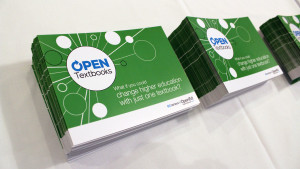 Open textbooks are a free option that can replace or supplement traditional textbooks. They are published with an open license, typically allowing readers to use, print, and modify (with attribution) the textbook. With the cost of textbooks from major academic publishers ever on the rise, open textbooks help reduce the cost of taking a course.
Open textbooks are a free option that can replace or supplement traditional textbooks. They are published with an open license, typically allowing readers to use, print, and modify (with attribution) the textbook. With the cost of textbooks from major academic publishers ever on the rise, open textbooks help reduce the cost of taking a course.
Inside Higher Ed sponsored a webinar on Open Educational Resources (OER) in April: “The Case for Open Educational Resources and Open Policies.” The presenter, Dr. Cable Green, Director of Global Learning at Creative Commons, included links to various clearinghouse collections and OER sites, which you can explore to learn more about what is available. As some examples of the kind of resources included in the webinar, here are some links Green shared, which I tweeted out during the event:
- Use “Find OER” to find all the varied OER collections: open4us.org/find-oer/
- Free to use courses at opencourselibrary.org
- Open K12 texts for English language arts: ck12.org/english/
- International consortium of OER with resources for texts, courses: oeconsortium.org
- Here’s an open English 101 course via Open Course Library: opencourselibrary.org/engl-101/
- OpenStax College offers a series of CC texts on intro topics (stats, econ, psych, etc)
Here are some example open resources that are designed for professional communications:
- Style for Students Online: Effective Technical Writing in the Information Age by Joe Schall
- Technical Report Writing by Carol A. Vidoli, NASA
- Online Technical Writing by David A.McMurrey
- Business Communication for Success by Scott McLean
As you look at open textbooks, you will notice some drawbacks. Open textbooks may not be as carefully edited as the alternatives from academic publishers. You may notice that features you take for granted are missing, like an index, a full table of contents, or ancillary materials to use with the text. If you are thinking of choosing an open textbook, think carefully about the amount of work that you and students will need to put into using the book.
If you are considering open resources for your classes, I suggest you proceed with caution. If you don’t have time to create any additional resources you need to use the text, open textbooks may not be the best choice. Additionally, be sure that the production quality is high enough for the course. It’s hard to insist that student work be error free if the textbook isn’t. Finally, if you are interested in open resources but worried about whether the text will work, you might begin by using some supplemental material alongside a text from an academic publisher.
Bottom line: Open textbooks do offer some significant advantages (in particular, the free pricetag), but if you are new to teaching a professional writing course, you may be better off choosing a text by an established academic publisher to ensure you have the support you need while you are developing your assignments and classroom activities.
[Photo: Open Textbook Summit 2014 Day 1 by BCcampus_News, on Flickr]